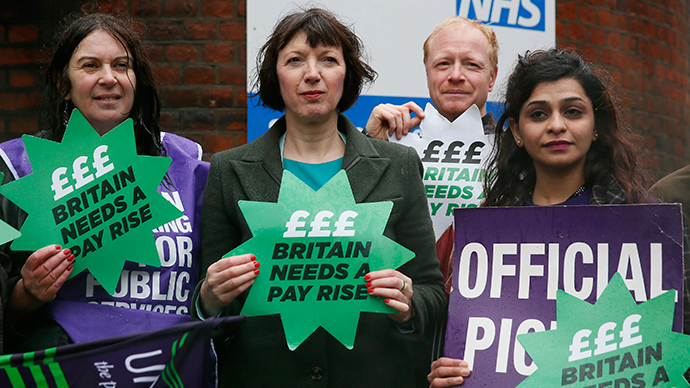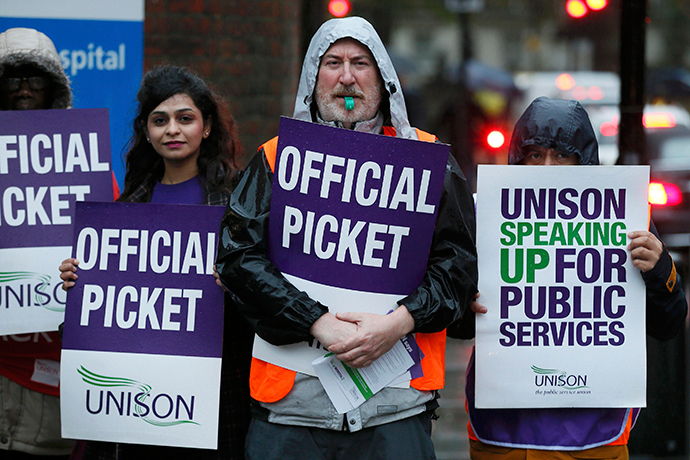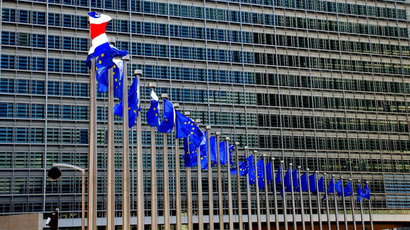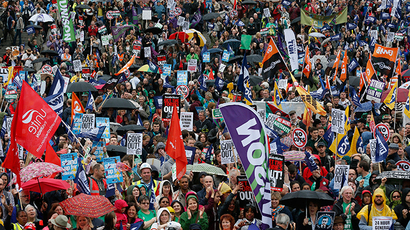Tens of thousands of NHS workers stage historic pay strike

Thousands of NHS workers, including ambulance staff, midwives and nurses staged a four-hour walkout on Monday morning. The action was the first strike over pay and conditions by NHS staff in 32 years.
The walkout was sparked by the government’s refusal to consider a modest 1 percent pay rise for National Health Service staff, and was orchestrated to pressure Health Secretary Jeremy Hunt to allocate more funds for NHS workers.
Health workers’ unions say their earnings have been reduced by 15 percent as a result of below inflation pay freezes since the current Tory-Liberal Democrat coalition came to power.
The strike, which was scheduled between 7 am and 11 am, was backed by five trade unions. Among those who partook in the historic action was Britain’s largest union, Unite.
Monday’s walkout also included members of GMB, Unison, Ucatt and the Royal College of Midwives (RCM). Picket lines were assembled across the nation at 100 specially designated sites.
@unisontweets so much support from the general public, solidarity for the nhs! #NHSstrikepic.twitter.com/4asmHMk5hp
— Natalie Gill (@natestgill) October 13, 2014
With many NHS professions joining industrial action for the first time in history, Unite warned the government that its continuous refusal to engage in negotiations with health service staff is alienating large sections of the NHS’s 1.4 million workforce.
Industrial action by midwives, nurses and other NHS staff prompted warnings of potential distress and inconvenience to patients across the country, dependent upon vital NHS services. But union leaders said Hunt was guilty of betraying staff and left them feeling undermined and unappreciated.
Why are we taking action? This is what most NHS staff will get this year.... #NHSstrike#NHSpayhttp://t.co/P9DHVaThcY
— UNISON - the union (@unisontweets) October 13, 2014
The strike marks the beginning of a month-long campaign whereby Unite members will adhere specifically to their contracted working hours – a so-called “work to rule” – and ambulance staff will refuse to work overtime.
GMB’s strike action on Monday will also be followed by a ban on overtime work in the ambulance service from Tuesday 14 to Friday 17 October, while other NHS employees will only work to their contracted hours throughout the same period.
The strike’s impact is thought to have varied across the country. Prior to the walkout, hospital trusts suggested the action would culminate in planned but non-critical operations being delayed. The trusts worked to dampen patients’ fears and appease potential disruption, however, by scheduling such procedures later on Monday or within a few days of delays.

The Unite union’s head of health, Rachael Maskell, said it was clear Prime Minister David Cameron and Health Secretary Jeremy Hunt were unprepared to offer NHS workers the pay they deserve.
“Instead they show disgraceful contempt for a dedicated workforce who have lost up to 15 percent in pay since 2010 and face being denied a 1 percent pay increase this year,” Maskell said.
“This industrial action could have been averted, but Health Secretary Jeremy Hunt’s continued refusal to sit down with health unions to try and find a solution has prompted widespread anger,” she added.
Solidarity to all #NHS workers on strike today! Shame on this government for saying no to 1%!!#fairpay@UNISONEastern#GMB#Unite#Essex
— Colchester TUC (@ColchesterTuc) October 13, 2014
Chief executive of the Royal College of Midwives (RCM), Cathy Warwick, whose members were striking for the first time in the college’s 133-year history, sharply criticized the pay conditions midwives, paramedics and other NHS staff are currently subject to.
Warwick said an independent panel of experts had made a government recommendation that midwives, paramedics and other NHS staff be issued a 1 percent pay rise, but that the Health Secretary had rejected its advice.
“At a time when MPs are set for a 10 percent pay hike, we’re told that midwives don’t deserve even a below-inflation 1 percent rise,” she added. The strike also comes with news that the directors of the UK’s 100 biggest firms earn 120 times the average amount earned by their staff.
On the day NHS staff striking "FTSE100 directors' earnings soar 21% amid longest squeeze on staff pay" says FT headline. #NHSstrike
— Ann Pettifor (@AnnPettifor) October 13, 2014
A spokesman for the Department of Health told the BBC it was “disappointed that trade unions are taking industrial action”.
“We cannot afford a pay rise in addition to increments – which disproportionately reward the highest earners – without risking frontline jobs,” the spokesman said.
Commenting on Monday’s walk out, the GMB union said its staff were taking action “with a heavy heart” as their primary objective was to deliver the highest quality patient care possible. But the union emphasized Hunt’s refusal to meet with its members had been central to its decision to back the strike.
Rehana Azam, GMB National Officer, warned the union’s members were facing increased workloads, with many being overworked.
“When the cost of living has increased members have endured not just pay freezes but pay cuts, as NHS pay rates are frozen to April 2013 rates,” he said.
Azam added that NHS workers did not accept Hunt’s argument that a 1 percent pay rise would result in job cuts.
Why does "pay restraint" always apply to nurses and midwives, but top dollar essential to attract consistently failing CEOs? #NHSstrike
— Alex Andreou (@sturdyAlex) October 13, 2014
“£3 billion was wasted on top-down NHS reorganization while £13.5 billion of NHS services are tendered to the private sector and over £1 billion NHS money has been returned to Treasury. This demonstrates the choices Jeremy Hunt is making over NHS Staff pay,” he said.
Azam’s comments come at a time when senior Tory members have acknowledged the coalition’s controversial NHS reforms were “a huge strategic error”. Neither the Prime Minister nor Chancellor George Osborne fully understood the proposals laid out by former Health Secretary Andrew Lansley, The Times recently reported.
Monday's four-hour NHS walkout follows new analysis, published by the Trade Union Congress (TUC), which reveals British workers are currently subject to the most protracted and severe decline in real wages since the Victorian age.














